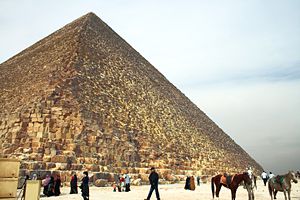Seven Wonders of the Ancient World
The Seven Wonders of the Ancient World is a well known list of seven remarkable constructions of classical antiquity. It was based on guide books popular among Hellenic (Greek) tourists, and only includes works located near the Mediterranean Rim. Written by Philo of Byzantium in 225 BC, the traditional list was neither the first, nor the last of such lists. The original Greek category was not "Wonders" but theamata, which translates closer to "things to be seen". The number seven was chosen because Greeks believed it to be magical.
Great Pyramid of Giza
- Main Article: Great Pyramid of Giza
The Great Pyramid of Giza, also known as Khufu's Pyramid is the oldest and largest of the three pyramids in the Giza complex. In fact, it was he tallest man-made structure for 3,800 years. It was constructed in just 20 years, culminating around 2560 BC, a feat far beyond the engineering capabilities of the rest of the world for many years to come. It is beleived to be built as a tomb for Egyptian king Khufu, known to the Greeks as Cheops.
There are three known chambers. The first to be constructed was the chamber known only as "the unfinished chamber". It was cut into the bedrock and left unfinished. The second chamber is the Queen's chamber, which is located further up, in the structure of the pyramid itself. The final chamber is called the King's chamber, and is located roughly in the center of the pyramid.
The four sides of the pyramid closely correlate to the cardinal directions on a compass, north, south, east, and west.
It is the only Wonder of the Ancient World that is still standing.
